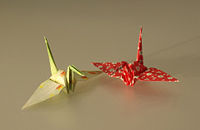Origami
Origami (おりがみ) is an ancient japanese card game, thought to be invented by Sun Tzu as a way of keeping his children entertained during particularly long rickshaw rides on the way to one of his famous epic battles. The game hasn't changed much over the years, except for the addition of many new rules, the cards themselves, and the removal of the original ruleset. Players usually compete for 'Id', an abstract concept of universal harmony, while the loser traditionally must eat a handful of dust. As all English-speaking players hate reading subtitles, an inferior Western remake of origami also exists, called killer origami.
The Deck[edit | edit source]
Each deck consists of 43 cards, distributed thusly:
- 9 Rice cards
- 9 Noodle cards
- 9 Plastic Lawn Ornament cards
- 9 Dishonorable Ronin cards
- 2 Telescopic Leg cards
- 2 Pirate Fight! cards
- 2 Happy Kitten cards
- 1 Rotting Whale Carcass card
In certain parts of Yorkshire, England, a 44th card is traditionally added, that of the "Racing Whippet". This card can be used to counter a TARENGA call, but only when the contestant is wearing the cloth cap of his clan.
Play[edit | edit source]
Up to seventeen players begin with five cards from any other card game (typically Happy Families). The Origami cards are shuffled and placed in the centre. This pile is known as the Bukkake. Order of play then commences according to the laws of Feng Shui. Players take turns to draw a card from the Bukkake, and may choose to play the card or keep it in their hands. Play then passes to the next person as dictated by the forces of Chi. Should a card be played, the consequences are thus:
- Rice - The player receives 20 points. Another player may counter this by playing a Telescopic Leg or a Happy Kitten, in which case the blocking player receives the points and a jam sandwich.
- Noodle - The player picks up all the cards on the table and puts them on his head. This can be countered with a Plastic Lawn Ornament, forcing the player to instead pick up the table and leave the cards where they are. However, this counter may be repelled by playing a Happy Kitten, in which case all players then sit on the table and put the cards on the floor.
- Plastic Lawn Ornament - The player receives a number of points equal to the number of players in the game multiplied by the number of cards in his hand added to the number of Rice cards already played minus the number of syllables in his opponents combined names divided by the number of punches his opponents manage to get in before he finishes the calculation. Can be countered with three Dishonarable Ronin.
- Dishonorable Ronin - The player may attempt to wrestle his opponents' cards from their grasp, earning 3 points for each one he salvages. These cards may be kept, returned or destroyed at the player's discretion. May be countered with a Rice card, or by running away.
- Telescopic Leg - An opponent of the player's selection must pour him a cup of steaming sake. If the player is satisfied with the quality of the drink and the humility shown by the pourer he may award everyone at the table 10 points. Anyone refusing these points must forfeit their cards and move to a point where the other players cannot see him. Can be countered with a Pirate Fight! or a Plastic Lawn Ornament card, in which case all of the players lose their points.
- Pirate Fight! - The player receives a number of points. This number is determined by the number of Pirate Fight! cards he is playing. A player can only play one Pirate Fight! card each turn.
- Happy Kitten - The player takes five cards from the Bukkake, plus one card from each player. He then throws these cards in the air, exclaiming "TARENGA!" (translation: 'He who catches the most cards gets ten points'). The player who catches the most cards gets 5 points. This can be countered by playing three Telescopic Leg cards, in which case he who catches the most cards gets lots of paper cuts.
- Rotting Whale Carcass - The player wins the game. Cannot be countered.
- Racing Whippet - The player may choose any opponent to have them make the player a Japanese-style RPG. Everyone gets points equal to the amount of yen required to buy it divided by the yen required to make it.

